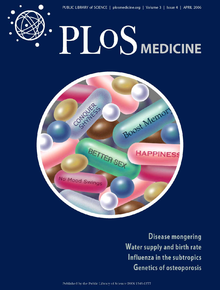- Disease mongering
-
Disease mongering is a pejorative term for the practice of widening the diagnostic boundaries of illnesses, and promoting public awareness of such, in order to expand the markets for those who sell and deliver treatments, which may include pharmaceutical companies, physicians, and other professional or consumer organizations.[1] Examples include male pattern baldness and certain social phobias.[1]
In discussions specifically about psychiatric diagnosis, the term is frequently used by proponents of the antipsychiatry movement[2] and Scientology-based critics[3] as just one part of their criticism of psychiatry or specifically biopsychiatry. Examples include ADHD and bipolar disorder.[4]
Proponents of this practice argue that the pharmaceutical industry is only providing the public with information about its options and that actual prescription is a matter to be discussed between patient and doctor. Opponents, however, claim that this approach leads to the unnecessary prescription of drugs, that its motivation is primarily or only to profit the drug companies, and that it may actually harm instead of help patients.[1]
A 2006 Newcastle, New South Wales international conference, reported in PLoS Medicine, explored the phenomenon of disease mongering.[5] Journalist Ray Moynihan satirised disease mongering in a BMJ "news" item that appeared in its April Fool's Day edition 2006, titled "Scientists find new disease: motivational deficiency disorder".[6]
Contents
See also
- Inverse benefit law
- Medicalization
- Pharmaceutical company
- Pharmaceutical marketing
- Quaternary prevention
- Schooliosis
References
- ^ a b c Moynihan R, Heath I, Henry D (2002). "Selling sickness: the pharmaceutical industry and disease mongering". BMJ 324 (7342): 886–91. doi:10.1136/bmj.324.7342.886. PMC 1122833. PMID 11950740. http://www.bmj.com/cgi/content/full/324/7342/886.
- ^ Fred Baughman (2000-09-25). "The Rise and Fall of ADD/ADHD". ICSPP. http://icspp.org/index.php?option=com_content&task=view&id=45&Itemid=72. Retrieved 2007-06-03.
- ^ Stephen Barlas and Psychiatric Times staff (2006-04-16). "Psychiatric Profession Current Target of Citizens Commission on Human Rights". CCHR. http://www.psychiatrictimes.com/p961110.html. Retrieved 2007-06-03.
- ^ Healy D (2006). "The latest mania: selling bipolar disorder". PLoS Med. 3 (4): e185. doi:10.1371/journal.pmed.0030185. PMC 1434505. PMID 16597178. http://medicine.plosjournals.org/perlserv/?request=get-document&doi=10.1371%2Fjournal.pmed.0030185.
- ^ Moynihan R, Henry D (eds).. "A Collection of Articles on Disease Mongering.". PLoS medicine, 2006.. http://collections.plos.org/diseasemongering-2006.php. Retrieved 2007-06-12.
- ^ Moynihan R (2006). "Scientists find new disease: motivational deficiency disorder.". BMJ 332 (7544): p. 745. doi:10.1136/bmj.332.7544.745-a. http://bmj.bmjjournals.com/cgi/content/extract/332/7544/745-a.
Further reading
- Saddichha S (2010)."Disease Mongering in Psychiatry: Is It Fact or Fiction?" World Medical & Health Policy: Vol. 2: Iss. 1, Article 15. DOI: 10.2202/1948-4682.1042
- Peter Conrad (2007), The Medicalization of Society: On the Transformation of Human Conditions into Treatable Disorders, Baltimore: Johns Hopkins University Press.
- Payer, Lynn (1992). Disease-Mongers. New York: John Wiley. ISBN 0-47100-737-4.
- Moynihan, Ray; Alan Cassels (2005). Selling sickness: How the world's biggest pharmaceutical companies are turning us all into patients. New York: Nation Books. ISBN 1-56025-697-4.
- Cassels, Alan (2007). The ABCs of Disease Mongering: An Epidemic in 26 Letters. Victoria, British Columbia, Canada: EmDash Publishing. ISBN 978-0-9780182-3-8.
- Melody Petersen (2008), Our Daily Meds: How the Pharmaceutical Companies Transformed Themselves into Slick Marketing Machines and Hooked the Nation on Prescription Drugs.
- Christopher Lane (2008), Shyness: How Normal Behavior Became a Sickness.
External links
Categories:- Pharmaceutical industry
- Public health
- Health
- Diseases and disorders
Wikimedia Foundation. 2010.

